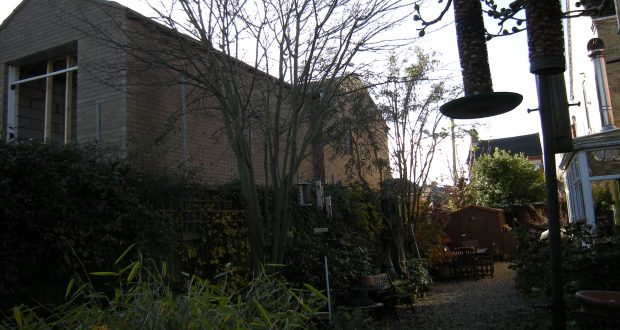A Spalding homeowner has hit out at a planning decision which she says has a devastating effect on her retirement property.
Karen LeBoeuf was hoping the application to South Holland District Council for a single-storey rear extension and two-storey side extension next to her property in Cross Street would be turned down. However, it was approved, much to the chagrin of Mrs LeBoeuf.
She said: “The planning department stated that ‘there would be some loss of light in the morning. However, as the sun comes high in the sky there should be no overshadowing.’
“I took some photographs that show the time and quite clearly demonstrate the complete lack of light to my garden, conservatory and kitchen. Our home and garden has been plunged into darkness and this industrial type building has ruined our enjoyment of it, but apparently this is not a planning issue.
“We had hoped to enjoy our retirement here having worked hard to pay for it over the last 20 years.”
A council spokesman said the planning officer’s report was considered in detail.
The report stated: “It was accepted that there would be impacts of the development on neighbouring properties, particularly number 40 (Mrs LeBoeuf’s property).
“However, it was not considered that the impacts would be so great as to conflict with Local Plan Policy SG17 which seeks to protect residential amenity.”
 Planning committee chairman Coun Roger Gambba-Jones (pictured) said: “The planning system is always about balancing one set of arguments against another. On balance, the case officer used their professional skills to determine that this proposal was acceptable in planning terms.
Planning committee chairman Coun Roger Gambba-Jones (pictured) said: “The planning system is always about balancing one set of arguments against another. On balance, the case officer used their professional skills to determine that this proposal was acceptable in planning terms.
“We do take our role in planning very seriously and accept that we can have a very profound impact on people’s lives. However, we are required to work within national policy and guidelines and cannot therefore give non-planning related issues the weight people would sometimes wish us to.
“We can sometimes give objectors false hope, by refusing an application because we give undue weight to their concerns and these are not underpinned by the planning policy or guidance. This then leads to an appeal being upheld and the objectors hopes dashed.
“Making unsound decisions can also be expensive, as if found to have acted unreasonably, the council and, therefore, the taxpayer, can find themselves paying the appellant’s costs. On a major application, these can be tens of thousands of pounds.
“On a personal note, over the years I’ve made no secret of my concerns about the practice of closing up the gaps between houses on our urban estates. In many instances these developments are already cramped. The overall impact it has on the street scene, once it becomes the norm, is always negative, turning a street of semis in to a street of virtual terraces.
“Unfortunately, government policy does not support my concerns and has in fact changed several times since 2010, making it far easier to extend in pretty much every direction under permitted development rights.”
 The Voice of Spalding and South Holland
The Voice of Spalding and South Holland




